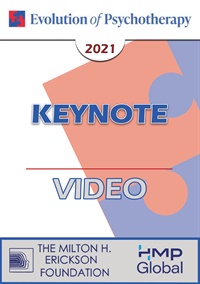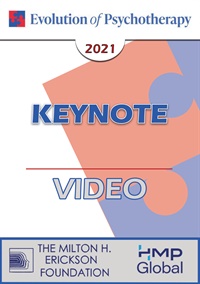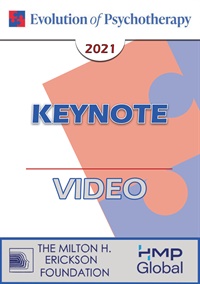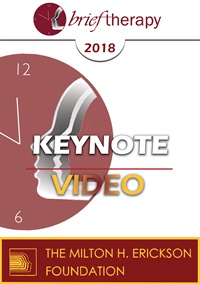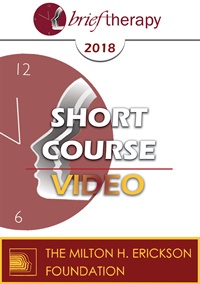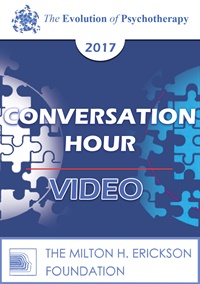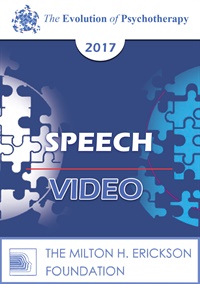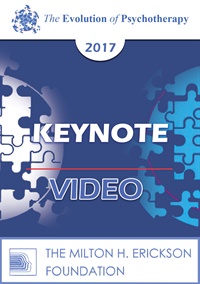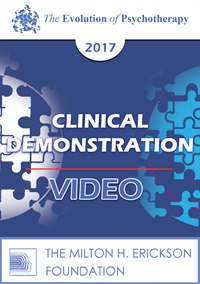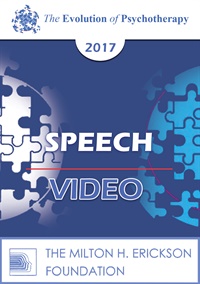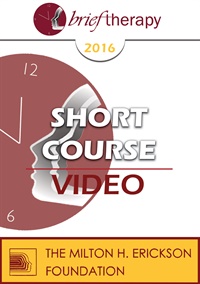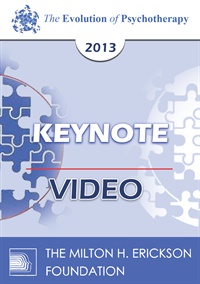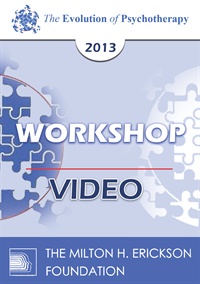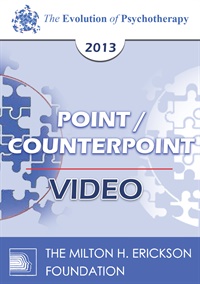- Average Rating:
- Not yet rated
- Topic Areas:
- Keynotes | Therapist Development | Consciousness | Identity | Attachment
- Categories:
- Evolution of Psychotherapy | Evolution of Psychotherapy 2021
- Faculty:
- Diane Ackerman, MFA, PhD
- Course Levels:
- Master Degree or Higher in Health-Related Field
- Duration:
- 1 hour
- Format:
- Audio and Video
- Original Program Date:
- Dec 05, 2021
- Short Description:
- This keynote is a sweeping, poetic tour of what makes a self, blending neuroscience, evolution, memory, relationships and metaphor into a vivid portrait of human identity. Diane Ackerman explores how the brain constructs experience, how relationships shape our inner life, and how memory, emotion and imagination continually revise who we are. Participants are invited into a playful, profound meditation on consciousness, connection and the ever-changing mosaic of selves we carry through the world.
- Price:
- $59.00 - Base Price
- Average Rating:
- Not yet rated
- Topic Areas:
- Keynotes | Positive Psychology | Psychology
- Categories:
- Evolution of Psychotherapy | Evolution of Psychotherapy 2021
- Faculty:
- Martin Seligman, PhD
- Course Levels:
- Master Degree or Higher in Health-Related Field
- Duration:
- 1 hour
- Format:
- Audio and Video
- Original Program Date:
- Dec 04, 2021
- Short Description:
- Well Being remains, in spite of Covid’s interruption, a plausible personal, corporate and planetary goal. I review the Age of Progress until Covid along with the barriers to continued progress. The belief in individual and collective Agency will determine our future. Efficacy, Optimism, and Imagination, the three parts of agency can be taught in the clinic, the classroom, and the corporation. Juliana of Norwich (1365) will be our beacon.
- Price:
- $59.00 - Base Price
- Average Rating:
- Not yet rated
- Topic Areas:
- Keynotes | Psychology
- Categories:
- Evolution of Psychotherapy | Evolution of Psychotherapy 2021
- Faculty:
- Philip Zimbardo, PhD
- Course Levels:
- Master Degree or Higher in Health-Related Field
- Duration:
- 1 hour
- Format:
- Audio and Video
- Original Program Date:
- Nov 30, 2021
- Short Description:
- This presentation will take the audience on an intellectual journey into and across many domains of psychology. For psychotherapists, a key message is the awareness of the social context of your treatment.
- Price:
- $59.00 - Base Price
Tags: Psychology
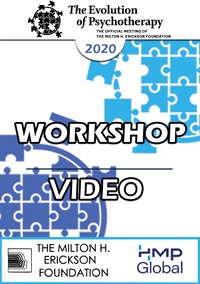
- Average Rating:
- Not yet rated
- Topic Areas:
- Trauma | Workshops | Art and Creativity | Social Psychology | Polyvagal Theory | Psychotherapy | Music | Psychology
- Categories:
- Evolution of Psychotherapy | Evolution of Psychotherapy 2020
- Faculty:
- Stephen Porges, PhD
- Course Levels:
- Master Degree or Higher in Health-Related Field
- Duration:
- 2 hours
- Format:
- Audio and Video
- Original Program Date:
- Dec 09, 2020
- Short Description:
- This presentation will focus on how Polyvagal Theory provides a plausible model to explain how and why intonation of voice and vocal music can support mental and physical health and enhance function during compromised states associated with illness, chronic stress, and trauma. The workshop will elaborate on the principles incorporated in the Safe and Sound Protocol™ and the lessons learned through preliminary clinical trials, current research, and feedback from clinicians applying the protocol to various clinical disorders including individuals with severe trauma histories.
- Price:
-
Sale is $29.00
price reduced from Base Price - $59.00
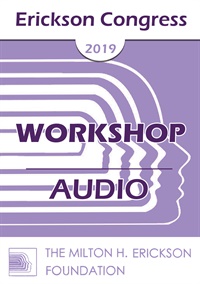
- Average Rating:
- Not yet rated
- Topic Areas:
- Workshops | Energy Psychology | Ericksonian Hypnosis and Therapy Techniques | Hypnosis | Trauma | Psychology | Brief Therapy | Mind-Body
- Categories:
- Erickson Congress | Erickson Congress 2019
- Faculty:
- Robert Schwarz, PsyD
- Duration:
- 1 Hour 54 Minutes
- Format:
- Audio Only
- Original Program Date:
- Dec 13, 2019
- Short Description:
- Energy Psychology (EP) techniques are easy to learn, safe/non-abreactive, evidenced-based, brief approaches, used for everything from bullying to rape to PTSD in veterans to survivors of genocide in Rwanda. Ericksonian Hypnosis and Energy Psychology are brief mind body approaches for treating trauma that both utilize interpersonal neurobiology and memory reconsolidation. We will rapidly review the research and theory supporting them. Then we will focus on teaching you the basics of using emotional freedom techniques (EFT-tapping) within a trauma informed framework and integrating it with Ericksonian principles.
- Price:
- $15.00 - Base Price
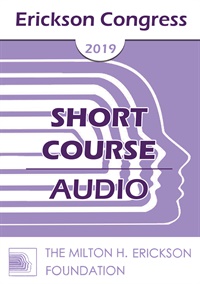
- Average Rating:
- Not yet rated
- Topic Areas:
- Short Courses | Abuse | Post-Traumatic Stress Disorder (PTSD) | Psychology | Psychotherapy | Trauma
- Categories:
- Erickson Congress | Erickson Congress 2019
- Faculty:
- Patrick McCarthy, MBCHB
- Duration:
- 1 Hour 19 Minutes
- Format:
- Audio Only
- Original Program Date:
- Dec 12, 2019
- Short Description:
- This exercise allows people to park all of their problems without any disclosure of their problems. Complete privacy. There is no need to discuss thir problems at all. The micro-structure of the session will be explored to show the various safety devices used. This astonishing exercise can be used for PTSD, abuse, trauma, losing car keys, financial concerns, i.e. absolutely anything! It received a great reception at the ISH meeting in Montreal.
- Price:
- $15.00 - Base Price
Tags: Abuse Psychology Psychotherapy PTSD Trauma
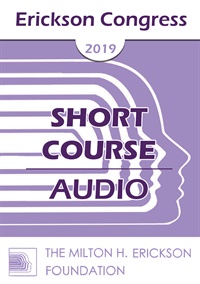
- Average Rating:
- Not yet rated
- Topic Areas:
- Short Courses | Hypnosis | Unconscious Processes | Dissociation | Psychology
- Categories:
- Erickson Congress | Erickson Congress 2019
- Faculty:
- Jesus Menendez Reyes
- Duration:
- 1 Hour 21 Minutes
- Format:
- Audio Only
- Original Program Date:
- Dec 12, 2019
- Short Description:
- This presentation will review the concept of dissociation and its evolution in modern Psychology and its relationship with hypnotic process, when it is described as a mind state of focused attention. We will explore the idea of dissociation between the conscious and unconscious mind during hypnosis and how it can lead to therapeutic success. Some practical exercises and demonstrations to provoke dissociate states.
- Price:
- $15.00 - Base Price
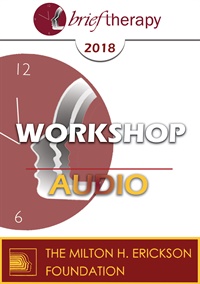
- Average Rating:
- Not yet rated
- Topic Areas:
- Workshops | Brief Therapy | Therapist Development
- Categories:
- Brief Therapy Conference | Brief Therapy Conference 2018
- Faculty:
- Michael Yapko, PhD
- Duration:
- 2:04:42
- Format:
- Audio Only
- Original Program Date:
- Dec 07, 2018
- Short Description:
- This workshop demonstrates how asking “how” questions can transform therapy by helping clients move beyond global thinking into clearer, more effective decision-making. Through vivid examples—ranging from career setbacks to relationship struggles—participants see how guiding clients to distinguish between what they can and cannot control reduces helplessness, sharpens choices, and fosters resilience.
- Price:
- $15.00 - Base Price
Credit available - Click Here for more information
- Average Rating:
- Not yet rated
- Topic Areas:
- Keynotes | Brief Therapy | Psychology | Psychotherapy
- Categories:
- Brief Therapy Conference | Brief Therapy Conference 2018 | Online Continuing Education
- Faculty:
- Frank Sulloway, PhD
- Course Levels:
- Master Degree or Higher in Health-Related Field
- Duration:
- 1:03:02
- Format:
- Audio and Video
- Original Program Date:
- Dec 07, 2018
- Short Description:
- BT18 Keynote 03 - Birth Order and Human Behavior: Understanding an Elusive Relationship - Frank J. Sulloway For more than half a century, studies of birth order and human behavior have been mired in disagreement over the existence, magnitude, and specific nature of this relationship. In this talk I argue that much of the previous research in this field has been substantially impeded because birth order is an imperfect proxy for multiple within-family influences that shape personality development within families, but that are overlooked in most studies. Much of the previous disagreements in this field can also be can be attributed to other methodological problems, including a failure to consider individual differences and their sometimes complex interactions with birth order, as well as the role of the behavioral context. This talk presents the results of a novel research design aimed at overcoming these problems and involving 438,251 responses collected using Internet surveys.
- Price:
-
Sale is $29.00
price reduced from Base Price - $59.00
Credit available - Click Here for more information
- Average Rating:
- Not yet rated
- Topic Areas:
- Short Courses | Energy Psychology | Psychology | Trauma | Brief Therapy
- Bundle(s):
- Learning Track - Turn Down the Trauma
- Categories:
- Brief Therapy Conference | Brief Therapy Conference 2018 | Online Continuing Education
- Faculty:
- Robert Schwarz, PsyD
- Course Levels:
- Master Degree or Higher in Health-Related Field
- Duration:
- 1:29:42
- Format:
- Audio and Video
- Original Program Date:
- Dec 06, 2018
- Short Description:
- Energy Psychology (EP) is a family of focused and brief approaches to releasing stuck energy in the mindbody system that usually is the result of unresolved small “t” or big “T” trauma. This workshop presents an elegant integration of Interpersonal neurobiology, polyvagal theory and memory reconsolidation that underlies energy psychology approaches to trauma treatment. Participants will learn how to incorporate this “power therapy” with their current methods to regulate emotional over-arousal and escalating patterns of reactivity while creating greater personal empowerment. Discover how to actually remove the traumatic energy/emotions from traumatic events that facilitates insight, mindfulness and post traumatic growth. Both the current research and the basic clinical protocols will be presented.
- Price:
-
Sale is $29.00
price reduced from Base Price - $59.00
Credit available - Click Here for more information
- Average Rating:
- Not yet rated
- Topic Areas:
- Conversation Hours | Positive Psychology | History of Psychotherapy | Psychology | Psychotherapy
- Categories:
- Evolution of Psychotherapy | Evolution of Psychotherapy 2017 | Online Continuing Education
- Faculty:
- Martin Seligman, PhD
- Course Levels:
- Master Degree or Higher in Health-Related Field
- Duration:
- 1:00:51
- Format:
- Audio and Video
- Original Program Date:
- Dec 16, 2017
- Short Description:
- I will review the past, present, and future of Learned Helplessness, Preparedness, Learned Optimism, Prospective Psychology and Positive Psychology.
- Price:
-
Sale is $29.00
price reduced from Base Price - $59.00
Credit available - Click Here for more information
- Average Rating:
- Not yet rated
- Topic Areas:
- Speeches | Memory | Continuing Education | Psychology | Psychotherapy
- Categories:
- Evolution of Psychotherapy | Evolution of Psychotherapy 2017 | Online Continuing Education
- Faculty:
- Elizabeth Loftus, PhD
- Course Levels:
- Master Degree or Higher in Health-Related Field
- Duration:
- 56:41
- Format:
- Audio and Video
- Original Program Date:
- Dec 16, 2017
- Short Description:
- For several decades, I have been manufacturing memories in unsuspecting minds. People can be led to believe that they did things that would have been rather implausible. They can be led to falsely believe that they had experiences that would have been emotional or traumatic had they actually happened. False memories, like true ones, also have consequences for people, affecting later thoughts, intentions, and behaviors. Can we tell true memories from false ones? In several studies, I created false memories in the minds of people, and then compared them to true memories. Once planted, the false memories look very much like true memories—in terms of behavioral characteristics, emotionality and neural signatures. If false memories can be so readily planted in the mind, do we need to think about “regulating” this mind technology? And what do these pseudo memories say about the nature of memory itself?
- Price:
-
Sale is $29.00
price reduced from Base Price - $59.00
Credit available - Click Here for more information
- Average Rating:
- Not yet rated
- Topic Areas:
- Keynotes | Positive Psychology | Psychology | Psychotherapy
- Categories:
- Evolution of Psychotherapy | Evolution of Psychotherapy 2017 | Online Continuing Education
- Faculty:
- Martin Seligman, PhD
- Course Levels:
- Master Degree or Higher in Health-Related Field
- Duration:
- 1:01:48
- Format:
- Audio and Video
- Original Program Date:
- Dec 15, 2017
- Short Description:
- Seligman will review cutting edge research, techniques, and applications in Positive Psychology, Positive Psychotherapy, and Positive Education.
- Price:
-
Sale is $29.00
price reduced from Base Price - $59.00
Credit available - Click Here for more information
- Average Rating:
- Not yet rated
- Topic Areas:
- Clinical Demonstrations | Psychotherapy | Psychology | Therapist Development
- Categories:
- Evolution of Psychotherapy | Evolution of Psychotherapy 2017 | Online Continuing Education
- Faculty:
- Steven Hayes, PhD
- Course Levels:
- Master Degree or Higher in Health-Related Field
- Duration:
- 57:37
- Format:
- Audio and Video
- Original Program Date:
- Dec 15, 2017
- Short Description:
- Psychological flexibility is one of the most studied and supported set of mediational processes in clinical intervention science. In this demonstration I will explain and then demonstrate how a focus on evidence-based flexibility processes in therapy can free clinicians from the linear march of protocol-based approaches, and foster instead a vital dance of creative facilitation of change, played out in the moment to moment context of an empowering therapeutic relationship that is nevertheless thoroughly evidence-based.
- Price:
-
Sale is $29.00
price reduced from Base Price - $59.00
Credit available - Click Here for more information
- Average Rating:
- Not yet rated
- Topic Areas:
- Speeches | Meditation, Spirituality and Yoga | Mindfulness | Psychology | Buddhism | Psychotherapy
- Categories:
- Evolution of Psychotherapy | Evolution of Psychotherapy 2017 | Online Continuing Education
- Faculty:
- Jack Kornfield, PhD
- Course Levels:
- Master Degree or Higher in Health-Related Field
- Duration:
- 57:11
- Format:
- Audio and Video
- Original Program Date:
- Dec 15, 2017
- Short Description:
- In this session we will explore the wise and loving perspectives of Buddhist Psychology. These transformative teachings and practices can awaken in clients and therapists alike an inner capacity for wakefulness, joy, dignity, and compassion—Buddha-nature. Combining practical and clinical examples, teaching stories, and innate wisdom we will consider the heart of healing, love, consciousness and the nature of mind.
- Price:
-
Sale is $29.00
price reduced from Base Price - $59.00
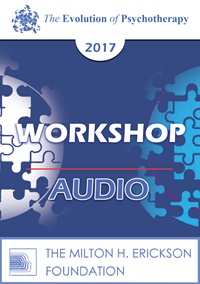
- Average Rating:
- Not yet rated
- Topic Areas:
- Workshops | Psychotherapy | Positive Psychology | Psychology
- Bundle(s):
- Learning Track - EP17 Erickson Download
- Categories:
- Evolution of Psychotherapy | Evolution of Psychotherapy 2017 | Evolution of Psychotherapy Erickson Learning Track
- Faculty:
- Stephen Gilligan, PhD
- Course Levels:
- Master Degree or Higher in Health-Related Field
- Duration:
- 2:01:32
- Format:
- Audio Only
- Original Program Date:
- Dec 13, 2017
- Short Description:
- A central currency in the therapeutic exchange is negative experiences--depression, anxiety, trauma, addiction, etc. This practical and positive approach assumes that each core human experience has equivalent potential to be positive or negative, depending on the human relationship to it; and thus focuses on how problems may be transformed to resources by skillful human connection. This process operates at two levels: (1) developing a generative state (in the therapist, client, and relationship field) and then (2) using specific methods of transforming negative experiences and behaviors. Multiple techniques and examples for will be given, along with an exercise and demonstration.
- Price:
- $15.00 - Base Price
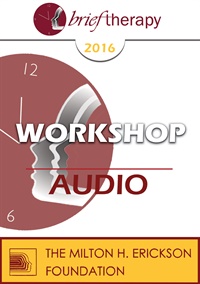
- Average Rating:
- Not yet rated
- Topic Areas:
- Psychology | Workshops | Brief Therapy | Therapeutic Relationship | Relationships
- Categories:
- Brief Therapy Conference | Brief Therapy Conference 2016
- Faculty:
- Bill O'Hanlon, MS
- Duration:
- 2:17:22
- Format:
- Audio Only
- Original Program Date:
- Dec 11, 2016
- Short Description:
- In brief therapy, we have to be better than long-term therapists in getting people to change and cooperate with treatment. Recent research from social psychology, behavioral economics and the new brain science show three powerful principles for being persuasive. Why do marketers know all this and most therapists do not? Come and learn how to be at least as persuasive as marketers.
- Price:
- $15.00 - Base Price
- Average Rating:
- Not yet rated
- Topic Areas:
- Post-Traumatic Stress Disorder (PTSD) | Psychology | Short Courses | Energy Psychology | Brief Therapy | Neurobiology | Polyvagal Theory
- Categories:
- Brief Therapy Conference | Brief Therapy Conference 2016
- Faculty:
- Robert Schwarz, PsyD
- Course Levels:
- Master Degree or Higher in Health-Related Field
- Duration:
- 1:30:38
- Format:
- Audio and Video
- Original Program Date:
- Dec 08, 2016
- Short Description:
- Clinical experience and research has shown energy psychology (EP) to be a highly effective brief treatment of PTSD in contexts that range from war related PTSD in US veterans to the effects of genocide in Rwandan orphans. This workshop presents an elegant integration of Interpersonal neurobiology, polyvagal theory and memory reconsolidation that underlies energy psychology approaches to trauma treatment. Discover how to actually remove the traumatic energy/emotions from traumatic events that facilitates insight, mindfulness and posttraumatic growth.
- Price:
-
Sale is $29.00
price reduced from Base Price - $59.00
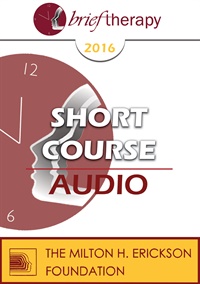
- Average Rating:
- Not yet rated
- Topic Areas:
- Short Courses | Neuroscience | Brief Therapy | Psychology | Trauma
- Categories:
- Brief Therapy Conference | Brief Therapy Conference 2016
- Faculty:
- Carol Nack, MSW | David Chametsky | Ira Scott
- Duration:
- 1:29:15
- Format:
- Audio Only
- Original Program Date:
- Dec 08, 2016
- Short Description:
- BT16 Short Course 30 - A Better Life Through Neuroscience and the Human Touch: Havening - Carol Nack, MSW, David Chametsky and Ira ScottIntroducing an extraordinary application of a recently acquired knowledge in the field of neuroscience. The techniques described are based in evolutionary biology. They offer a person the opportunity to live a healthier, hopefully happier, and more productive life. Long standing psychological problems are resolved and disturbing memories fade into the irretrievable past, just a story that lacks the previous affect.
- Price:
- $15.00 - Base Price
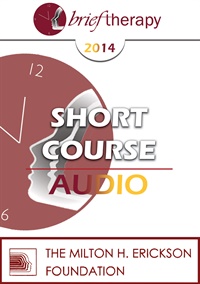
- Average Rating:
- Not yet rated
- Topic Areas:
- Short Courses | Multicultural | Existential Therapy | Brief Therapy | Meditation, Spirituality and Yoga
- Categories:
- Brief Therapy Conference | Brief Therapy Conference 2014
- Faculty:
- Naji Abi-Hashem, PhD
- Duration:
- 1:06:56
- Format:
- Audio Only
- Original Program Date:
- Dec 11, 2014
- Short Description:
- This short course reframes resilience as a cultural, communal and spiritual force rather than just an individual trait. Through stories, cross-cultural examples and practical questions, the presenter shows how people draw strength from heritage, community bonds, generational wisdom and meaningful relationships. Participants learn how to help clients reconnect with cultural identity, mobilize resources, and build resilience that supports adaptation, creativity and purpose in a rapidly changing world.
- Price:
- $15.00 - Base Price
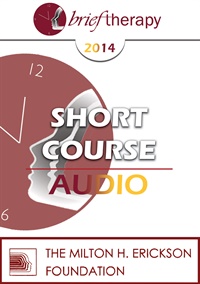
- Average Rating:
- Not yet rated
- Topic Areas:
- Trauma | Short Courses | Memory | Ericksonian Hypnosis and Therapy Techniques | Psychology
- Categories:
- Brief Therapy Conference | Brief Therapy Conference 2014
- Faculty:
- Dan Short, PhD
- Duration:
- 1:32:01
- Format:
- Audio Only
- Original Program Date:
- Dec 11, 2014
- Short Description:
- Ericksonian trauma work utilizes the experience of the present to redefine the past, while remaining future oriented. Memory reconsolidation occurs as memories are physically altered and re-encoded with new emotional elements. More than symptom relief, the intentional use of imagination and creative problem solving ensures greater resiliency for future challenges.
- Price:
- $15.00 - Base Price
- Average Rating:
- Not yet rated
- Topic Areas:
- Psychology | Keynotes | Positive Psychology | Psychotherapy
- Categories:
- Evolution of Psychotherapy | Evolution of Psychotherapy 2013
- Faculty:
- Martin Seligman, PhD
- Course Levels:
- Master Degree or Higher in Health-Related Field
- Duration:
- 57:25
- Format:
- Audio and Video
- Original Program Date:
- Dec 15, 2013
- Short Description:
- Positive Psychology measures and attempts to build PERMA: Positive Emotion, Engagement, Relationships, Meaning, and Accomplishment. I present recent findings from individuals, the clinic, organizations, and nations, as well as evidence-based techniques for building PERMA.
- Price:
-
Sale is $29.00
price reduced from Base Price - $59.00
- Average Rating:
- Not yet rated
- Topic Areas:
- Workshops | Social Psychology | Psychotherapy | Psychology
- Categories:
- Evolution of Psychotherapy 2013 | Evolution of Psychotherapy
- Faculty:
- Bill O'Hanlon, MS
- Course Levels:
- Master Degree or Higher in Health-Related Field
- Duration:
- 1:40:33
- Format:
- Audio and Video
- Original Program Date:
- Dec 15, 2013
- Short Description:
- Marketers are learning about and using the latest research on how to persuade people to change their views and behavior, but psychotherapists generally don’t know about or use this research. This session, using videos, audios and stories to bring the material alive, will teach you three powerful methods for radically increasing cooperation in therapy.
- Price:
-
Sale is $29.00
price reduced from Base Price - $59.00
- Average Rating:
- Not yet rated
- Topic Areas:
- Workshops | Meditation, Spirituality and Yoga | Psychology | Mindfulness | Buddhism | Psychotherapy
- Categories:
- Evolution of Psychotherapy 2013 | Evolution of Psychotherapy
- Faculty:
- Jack Kornfield, PhD
- Course Levels:
- Master Degree or Higher in Health-Related Field
- Duration:
- 2:51:15
- Format:
- Audio and Video
- Original Program Date:
- Dec 14, 2013
- Short Description:
- In this workshop we will explore the principles and practices of Buddhist Psychology, and how mindfulness, compassion and related practices can be applied in clinical and pragmatic ways in the West. Through teachings, case studies, stories and guided trainings, we will learn the positive strengths of these powerful approaches and experience a taste of their benefits.
- Price:
-
Sale is $29.00
price reduced from Base Price - $59.00
- Average Rating:
- Not yet rated
- Topic Areas:
- Psychotherapy | Point/Counterpoint Sessions | Consciousness | Mind-Body | Psychology | Therapist Development
- Categories:
- Evolution of Psychotherapy | Evolution of Psychotherapy 2013
- Faculty:
- Ernest Rossi, PhD | Cloe Madanes, HDL, LIC | Richard Landis, PhD
- Course Levels:
- Master Degree or Higher in Health-Related Field
- Duration:
- 1:23:25
- Format:
- Audio and Video
- Original Program Date:
- Dec 12, 2013
- Short Description:
- Facilitating the RNA/DNA epigenetics of creating new consciousness is the next step in the evolution of psychotherapy. Restricting psychotherapy to the limitations of the cognitive-behavioral level is becoming a disservice to psychology. We must embrace the bioinformatics of the new technological devices that make it possible to assess and facilitate the dynamics of gene expression and brain plasticity economically within a single session of psychotherapy.
- Price:
-
Sale is $29.00
price reduced from Base Price - $59.00


